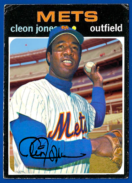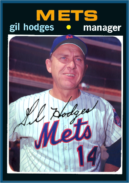
 The 1969 New York Mets will forever be remembered as a group of ballplayers that resurrected a franchise from the doldrums of the National League to become improbable World Series champions.
The 1969 New York Mets will forever be remembered as a group of ballplayers that resurrected a franchise from the doldrums of the National League to become improbable World Series champions.
While the 25 players of course left a lasting impact with the city and the fans, it was the team’s manager – the beloved Brooklyn legend Gil Hodges – that guided the ship to greatness.
We recently passed an important anniversary that defined both that memorable season and more importantly Hodges’ tenure as Mets manager.
On Wednesday, July 30, 1969, the Mets faced the Houston Astros in a doubleheader at Shea Stadium. The team – which began the day 14 games over the .500 mark – dropped a 16-3 contest in the first game, and the second game wasn’t going much better.
Young fireballer Nolan Ryan replaced starter Gary Gentry in the top of the third inning after the latter surrendered six runs. The first batter Ryan faced was Astros catcher Johnny Edwards.
Edwards hit a ball to left field and stretched what could have potentially been a single into a double after Mets left fielder Cleon Jones appeared not to hustle for the ball. That’s a big no-no when Hodges is your manager.
Meanwhile, Hodges’ son Gil Hodges Jr., who was 19 at the time, vividly remembers what happened next as he watched the game on television.
“I could close my eyes and see it now,” Hodges Jr. said.
Hodges, who had just made a pitching change to bring Ryan into the game, emerged from the dugout and started walking out onto the field. He passed the mound and began walking toward the shortstop position.
“The person on the Mets who was the most fearful was (shortstop) Buddy Harrelson,” Hodges Jr. said. “Buddy Harrelson used to tell me all the time. He was as scared as he had ever been in his life when my father walked past the mound because he thought he was coming to him. Once he got passed him, he said his whole body just relaxed.”
Hodges was instead heading straight toward Jones. He asked his star outfielder what was going on or if he was hurt. Jones responded that he was not hurt, though his ankle was a little tender, and that the field conditions were not the best after earlier rainfall.
According to Hodges Jr., Hodges simply said to Jones, “Fine. Come with me.”
Turning Point Moment
Hodges pulled his No. 3 hitter, who at the time was hitting .346 after having doubled in the first inning, and replaced him with Ron Swoboda. The Mets went on to lose the game, 11-5, but what happened in that third inning became a turning point for the ’69 Mets.
After Hodges – a devout Catholic who was a parishioner at Our Lady Help of Christians, Midwood – took over as Mets manager in 1968, he immediately introduced a new culture to a team that had been the laughing stock of the league through its first six years of existence.
Growing up, Hodges Jr. saw firsthand that his father always demanded 100 percent.
“It really doesn’t matter what you want to do, but whatever you choose to do in life, just make sure you do it the best you can,” Hodges Jr. said of advice he received from his father. “That was his (Hodges) philosophy, and I think that’s what he was able to instill in his ballplayers.
“When you walked onto that field, you had a responsibility not only to your teammates, not only to the fans, not only to the owners of the ball club, but most of all to yourself to do the best you could. And no one could ever argue or say anything if you could fulfill that.”
The incident with Jones proves that Hodges was a man of his word.
“This is your .340 hitter,” Hodges Jr. said. “This isn’t someone who you’re putting in for defensive purposes in the seventh inning. This is your .340 star, and you’re walking out to left field and you’re asking him to come with you. Why? If you can’t perform at your best, you’re detrimental to the other eight parts of this unit, and that’s a big message to send to everyone.”
When the other players saw this, they were dumbfounded. They knew that Hodges would only accept full-on effort at all times – no matter the score or inning of a game. More importantly, the incident showed that Hodges treated all of his players equally.
“If you do not give 100 percent, regardless of who you are, you’re going to be set as an example and you’re going to be taken out of the game,” said Hodges Jr. “Now everybody’s step gets just a little bit quicker. Everybody’s attention gets just heightened a little bit. And every time they cross those white lines, they know what’s expected of them.
“They know there’s no protection regardless of how good or who they are. Everyone will be judged on the same level. Tom Seaver, Cleon Jones, Al Weis will all be judged on the same level.”
The Mets obviously responded to Hodges’ action, since they finished the season on a 45-19 run from that moment to post 100 victories. The team won the National League pennant and went on to defeat the mighty Baltimore Orioles in the World Series. The “Miracle Mets” were born and were a product of their manager’s philosophy.
Hodges knew that teaching his players to be men accountable for their actions would in turn translate to success on the ball field. More than 45 years after Hodges’ death, players like Seaver, Harrelson and Jerry Koosman are remembered as great men of the game as well as great ballplayers.
“Those are the things that, if he (Hodges) were alive today, he would be most proud of, regardless of titles and championships and World Series,” Hodges Jr. said.
We can all learn a little something from Hodges: Giving your absolute best effort in anything that you do will allow you to earn the respect of your peers.
Contact Jim Mancari via email at jmmanc@gmail.com.
